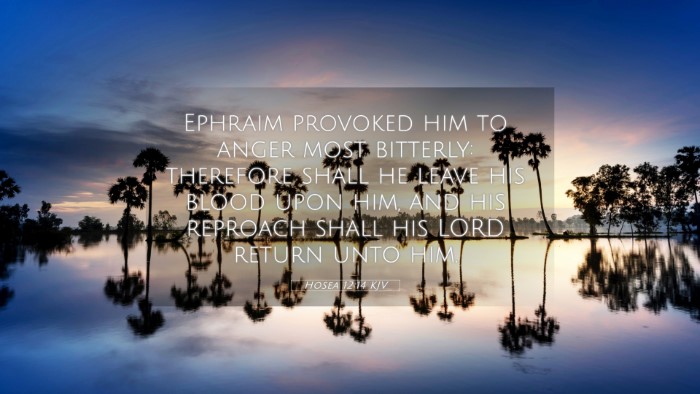Old Testament
Genesis Exodus Leviticus Numbers Deuteronomy Joshua Judges Ruth 1 Samuel 2 Samuel 1 Kings 2 Kings 1 Chronicles 2 Chronicles Ezra Nehemiah Esther Job Psalms Proverbs Ecclesiastes Song of Solomon Isaiah Jeremiah Lamentations Ezekiel Daniel Hosea Joel Amos Obadiah Jonah Micah Nahum Habakkuk Zephaniah Haggai Zechariah MalachiHosea 12:14 Similar Verses
Hosea 12:14 Cross References
Ephraim provoked him to anger most bitterly: therefore shall he leave his blood upon him, and his reproach shall his LORD return unto him.
Uncover the Rich Themes and Topics of This Bible Verse
Listed below are the Bible themes associated with Hosea 12:14. We invite you to explore each theme to gain deeper insights into the Scriptures.
Hosea 12:14 Cross Reference Verses
This section features a detailed cross-reference designed to enrich your understanding of the Scriptures. Below, you will find carefully selected verses that echo the themes and teachings related to Hosea 12:14 KJV. Click on any image to explore detailed analyses of related Bible verses and uncover deeper theological insights.
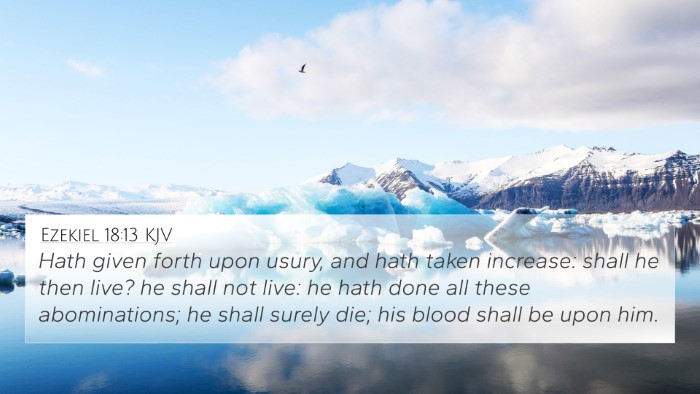
Ezekiel 18:13 (KJV) »
Hath given forth upon usury, and hath taken increase: shall he then live? he shall not live: he hath done all these abominations; he shall surely die; his blood shall be upon him.

Daniel 11:18 (KJV) »
After this shall he turn his face unto the isles, and shall take many: but a prince for his own behalf shall cause the reproach offered by him to cease; without his own reproach he shall cause it to turn upon him.
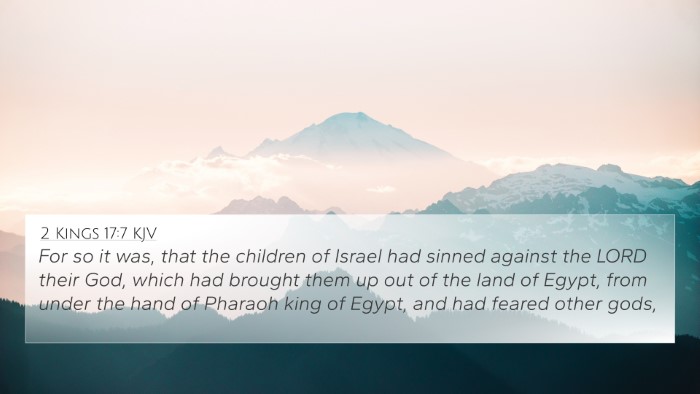
2 Kings 17:7 (KJV) »
For so it was, that the children of Israel had sinned against the LORD their God, which had brought them up out of the land of Egypt, from under the hand of Pharaoh king of Egypt, and had feared other gods,

Ezekiel 24:7 (KJV) »
For her blood is in the midst of her; she set it upon the top of a rock; she poured it not upon the ground, to cover it with dust;
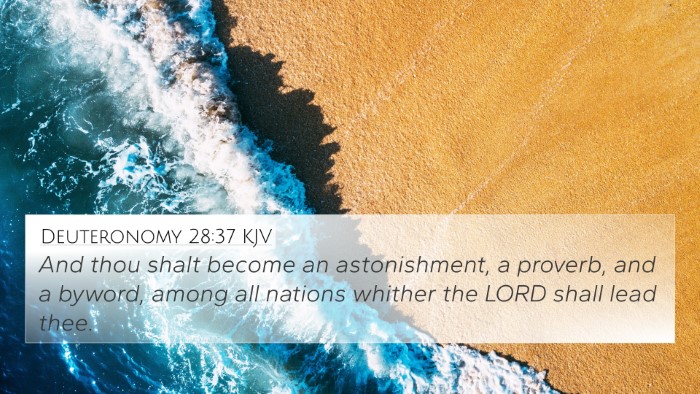
Deuteronomy 28:37 (KJV) »
And thou shalt become an astonishment, a proverb, and a byword, among all nations whither the LORD shall lead thee.
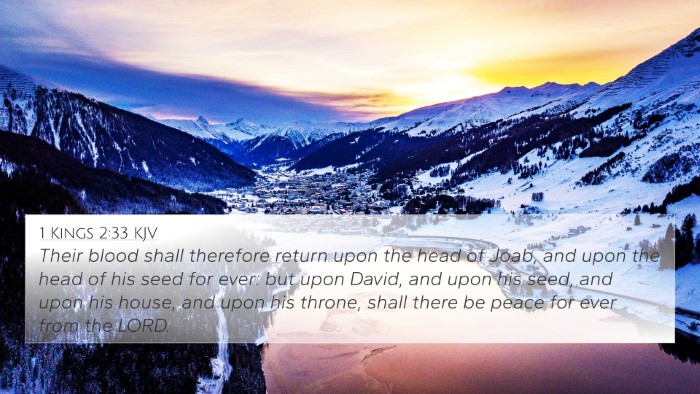
1 Kings 2:33 (KJV) »
Their blood shall therefore return upon the head of Joab, and upon the head of his seed for ever: but upon David, and upon his seed, and upon his house, and upon his throne, shall there be peace for ever from the LORD.
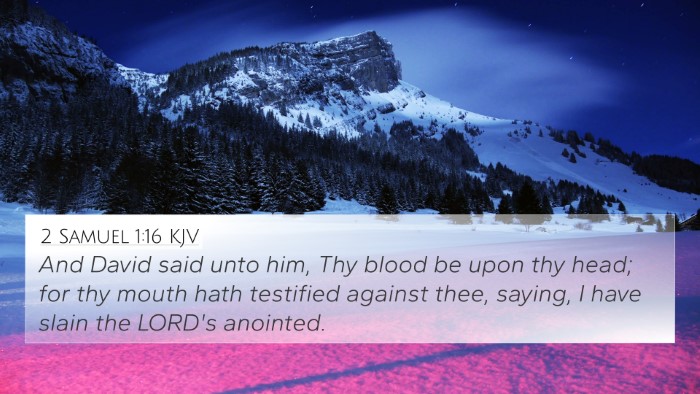
2 Samuel 1:16 (KJV) »
And David said unto him, Thy blood be upon thy head; for thy mouth hath testified against thee, saying, I have slain the LORD's anointed.
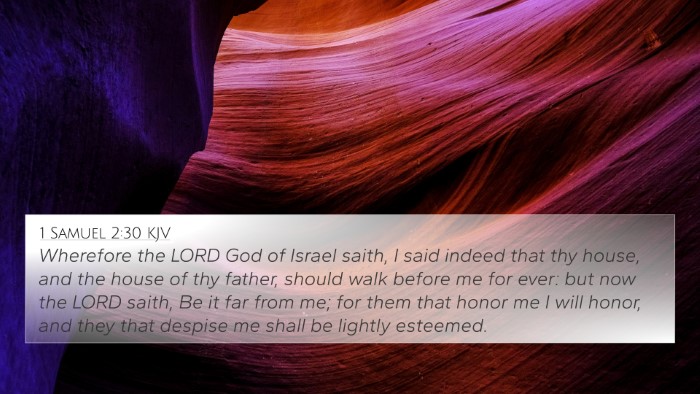
1 Samuel 2:30 (KJV) »
Wherefore the LORD God of Israel saith, I said indeed that thy house, and the house of thy father, should walk before me for ever: but now the LORD saith, Be it far from me; for them that honor me I will honor, and they that despise me shall be lightly esteemed.
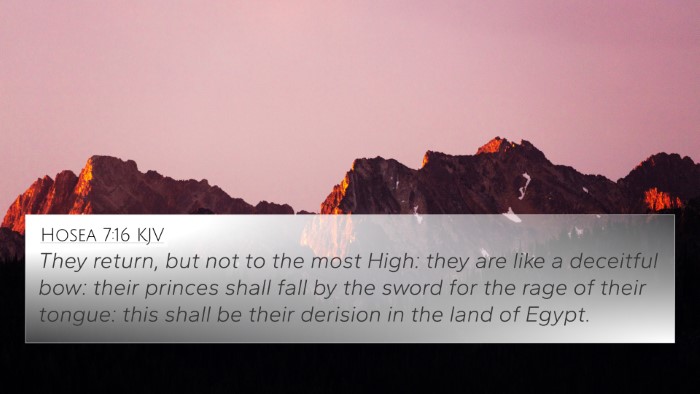
Hosea 7:16 (KJV) »
They return, but not to the most High: they are like a deceitful bow: their princes shall fall by the sword for the rage of their tongue: this shall be their derision in the land of Egypt.
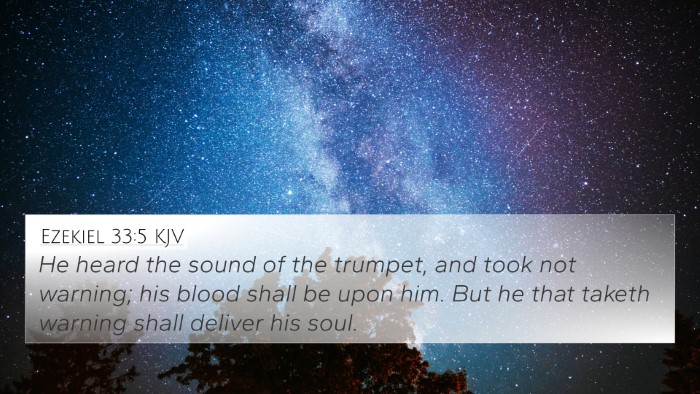
Ezekiel 33:5 (KJV) »
He heard the sound of the trumpet, and took not warning; his blood shall be upon him. But he that taketh warning shall deliver his soul.
Hosea 12:14 Verse Analysis and Similar Verses
Understanding Hosea 12:14
Verse Text: "Ephraim provoked him to anger most bitterly; therefore shall he leave his blood upon him, and his reproach shall his Lord return unto him." (Hosea 12:14)
Summary and Interpretation
This verse from the book of Hosea reflects God's deep frustration with the northern kingdom of Israel, represented here by Ephraim. The prophetic warning indicates that the consequences of their actions—specifically, their provocations and rebellion against God—will inevitably lead to divine judgment.
Thematic Insights from Commentaries
- Matthew Henry's Commentary: Henry emphasizes the gravity of Ephraim's sin and how it stirs God's anger. He notes that the metaphor of "blood" symbolizes guilt and the repercussions of sin. The phrase "his reproach shall his Lord return unto him" suggests that the shame and consequences of their actions will be their undoing.
- Albert Barnes' Notes: Barnes highlights the importance of understanding the context of Israel’s sins—idolatry, falsehood, and betrayal of their covenant with Yahweh. He elucidates that their persistent rebellion would not go unpunished, and divine justice would demand accountability for their bitter provocations against God.
- Adam Clarke's Commentary: Clarke provides insights into the nature of the reproach that will be returned to Ephraim. He explains that this humiliation would stem from their own sins and choices, illustrating a key theological theme that one reaps what they sow. Clarke draws connections to Israel's historical pattern of turning away from God's guidance, predicting their downfall.
Connections Between Bible Verses
This verse has several relevant cross-references that deepen the understanding of its themes. Below are key connections:
- Jeremiah 2:19: "Thine own wickedness shall correct thee, and thy backslidings shall reprove thee."
- Isaiah 1:4: "Ah sinful nation, a people laden with iniquity, a seed of evildoers, children that are corrupters..."
- Psalm 51:4: "Against thee, thee only, have I sinned, and done this evil in thy sight..."
- Ezekiel 18:30: "Therefore I will judge you, O house of Israel, every one according to his ways..."
- Hosea 10:13: "Ye have plowed wickedness, ye have reaped iniquity..."
- Galatians 6:7: "For whatsoever a man soweth, that shall he also reap."
- Romans 1:18: "For the wrath of God is revealed from heaven against all ungodliness and unrighteousness of men..."
- Proverbs 14:9: "Fools make a mock at sin: but among the righteous there is favor."
- Revelation 3:19: "As many as I love, I rebuke and chasten: be zealous therefore, and repent."
- 1 Peter 4:17: "For the time is come that judgment must begin at the house of God..."
Exploration of Thematic Bible Verse Connections
The verse from Hosea reflects prevalent themes seen throughout Scripture concerning sin, judgment, and the need for repentance. By examining these cross-references, one finds a unifying narrative about God's justice and grace. The books of the prophets and the New Testament epistles both address similar themes of accountability and the consequences of turning away from God.
Tools for Bible Cross-Referencing
For deeper exploration, various tools and methodologies exist to aid in cross-referencing biblical texts:
- The Bible concordance provides an index of terms and phrases to assist readers in finding related scriptures.
- A cross-reference Bible study allows for thematic connections between disparate biblical texts, enhancing comprehension and facilitating comparative analysis.
- Using a cross-reference Bible study guide can help identify and follow significant scriptural themes throughout the Bible.
- Bible reference resources such as commentaries and expository guides can shed additional light on interconnected verses.
- Employing comprehensive Bible cross-reference materials enables a systematic approach to studying scripture.
Concluding Thoughts on Cross-Referencing Biblical Texts
Understanding Hosea 12:14 in conjunction with other biblical passages enriches one's biblical study and cultivates a deeper appreciation for the interconnectedness of the Scriptures. Such an approach not only illuminates individual verses but also reveals the comprehensive narrative of God’s dealings with humanity.
By using cross-references effectively, readers are encouraged to explore the connections between Bible verses and discover the profound themes that interweave through both the Old and New Testaments. Whether for personal study or sermon preparation, cross-referencing adds depth and clarity to one's understanding of God's Word.

